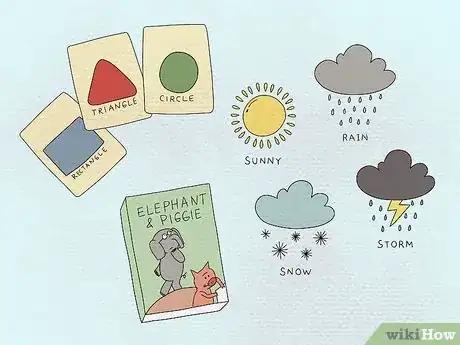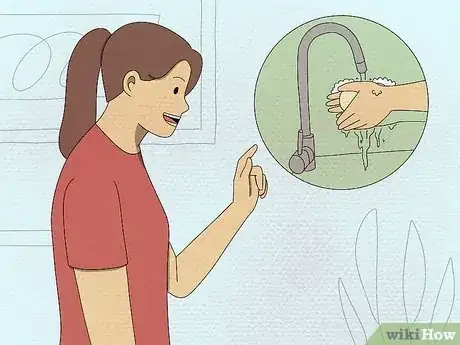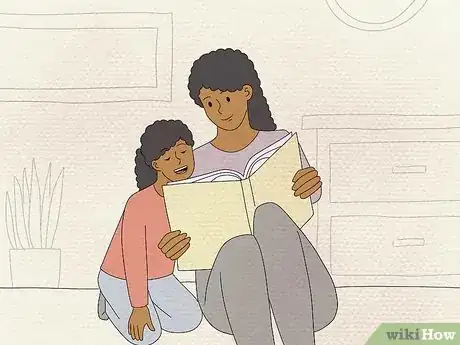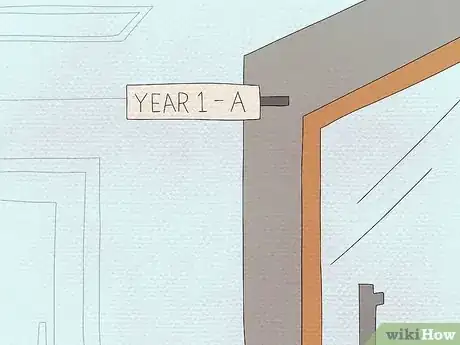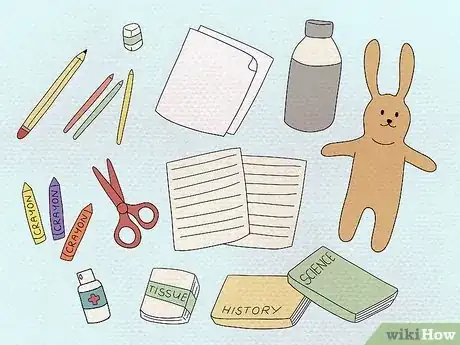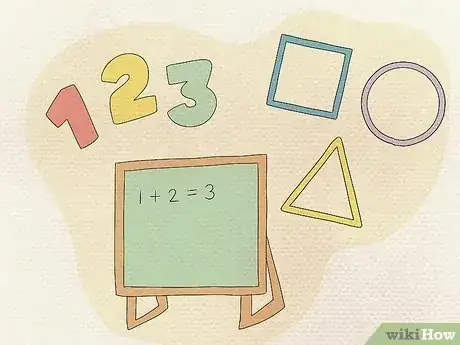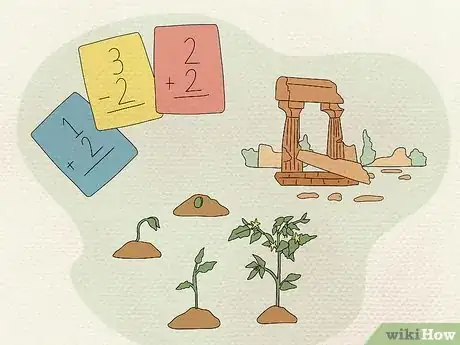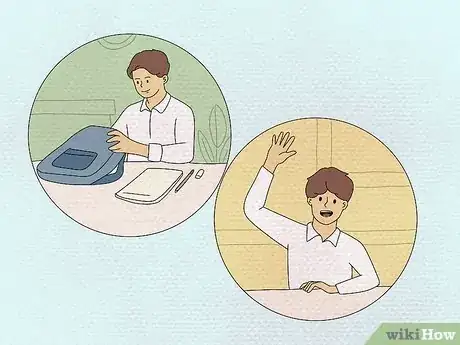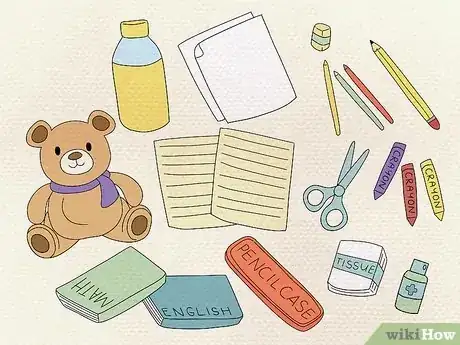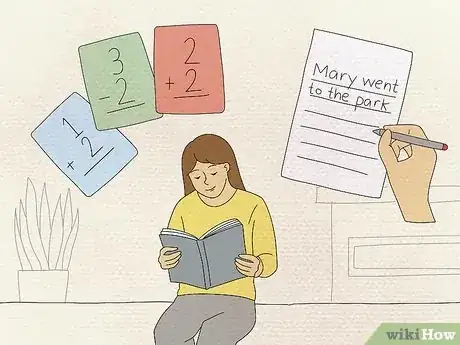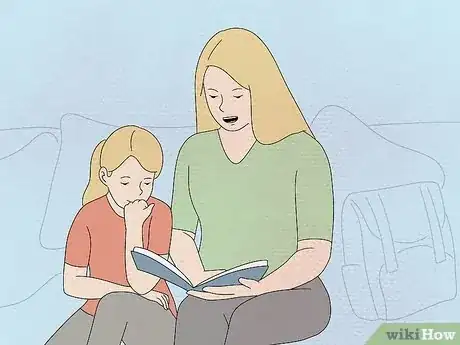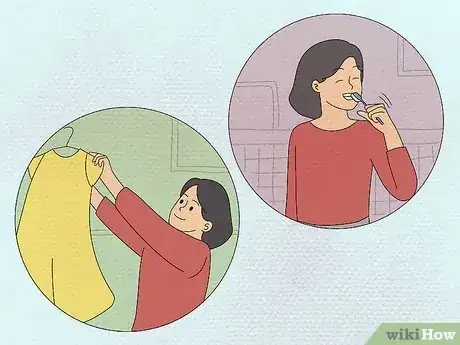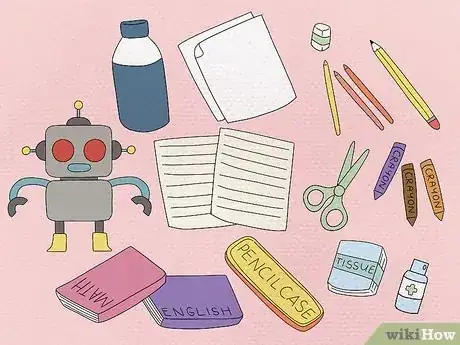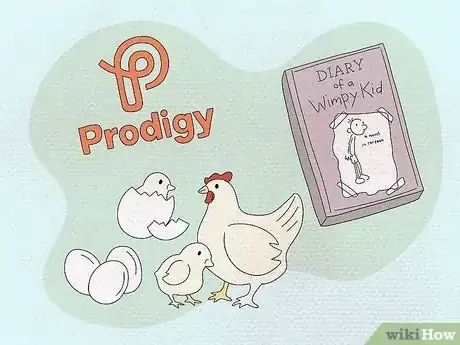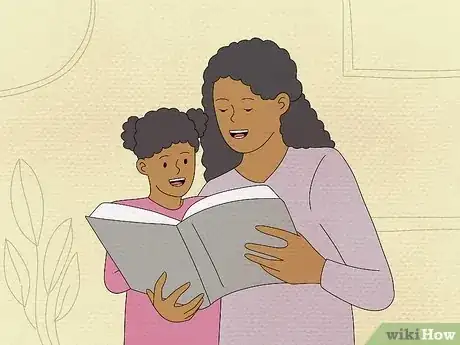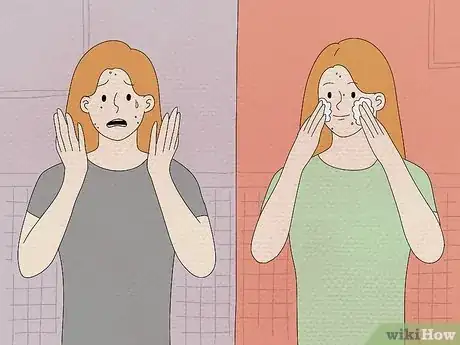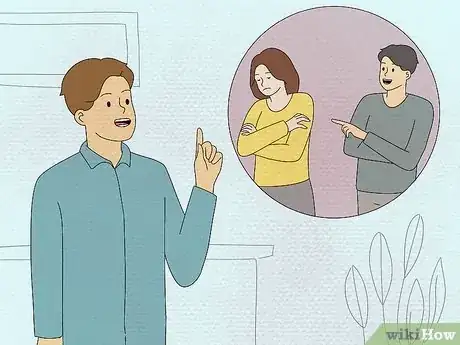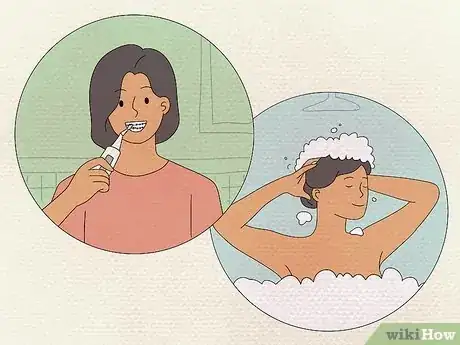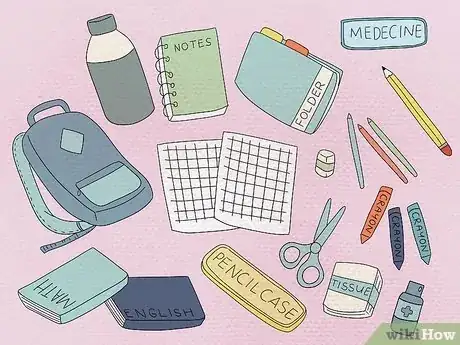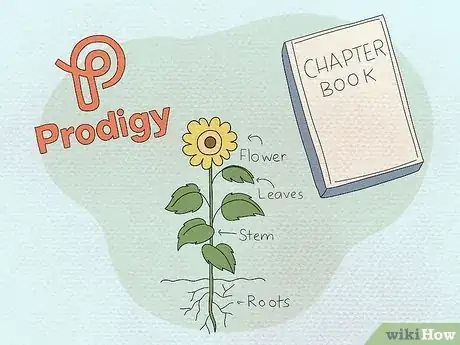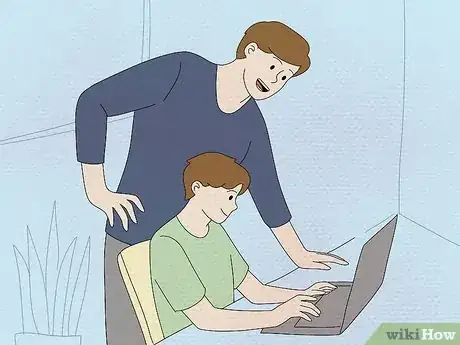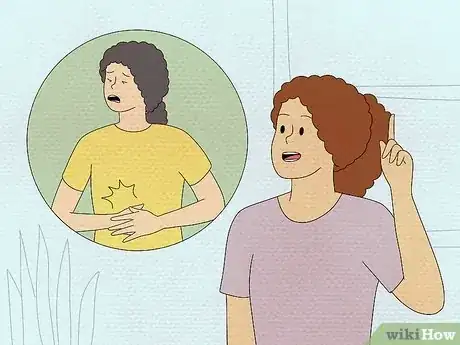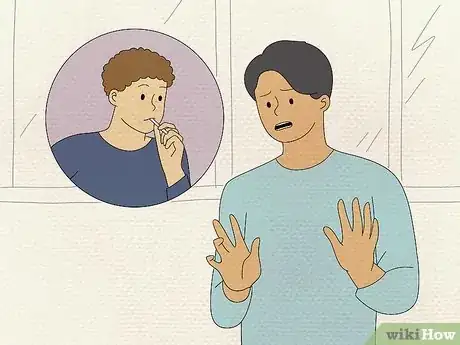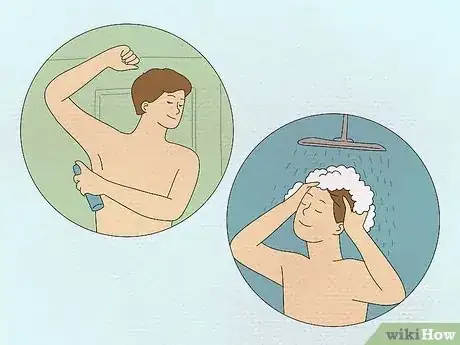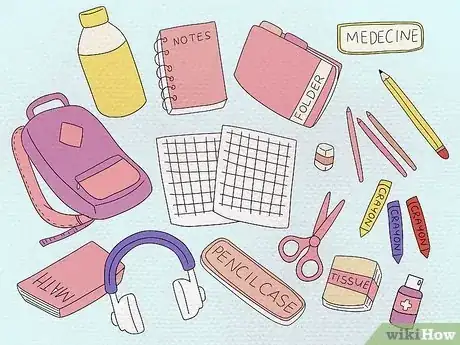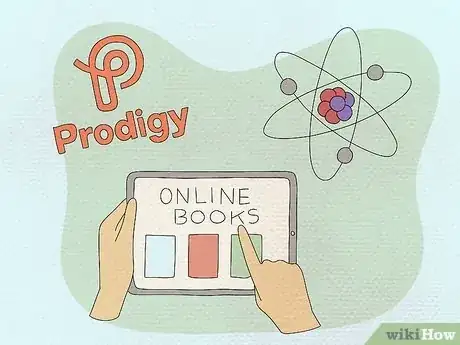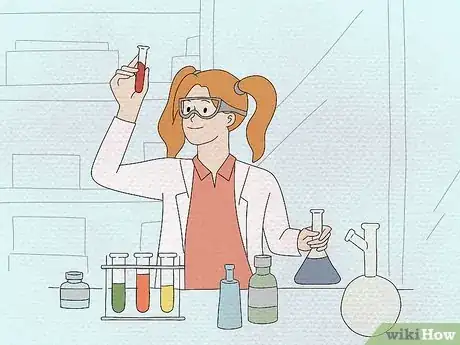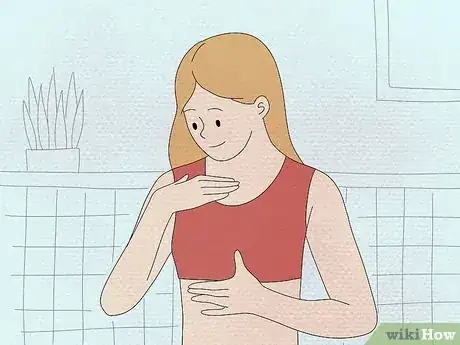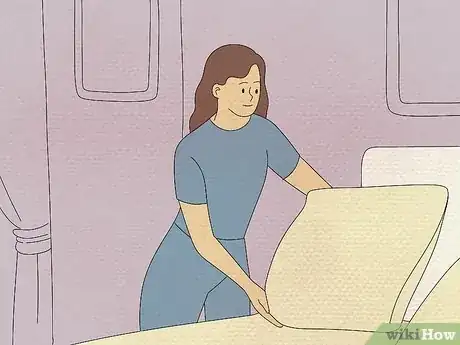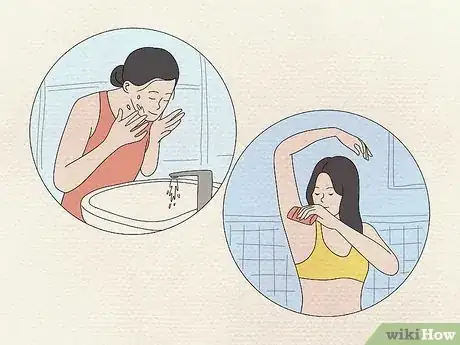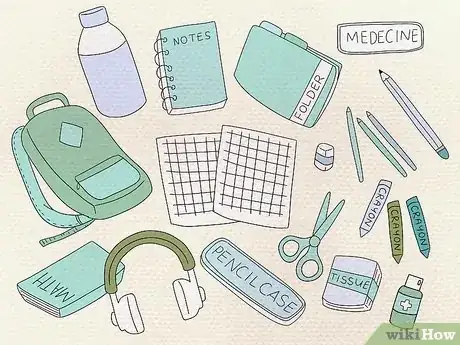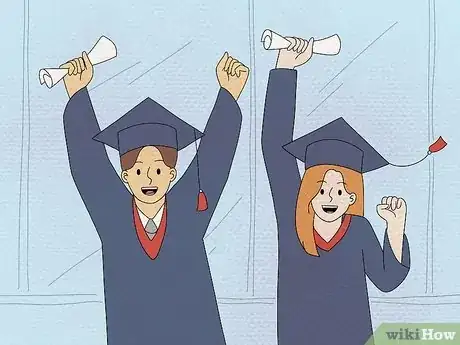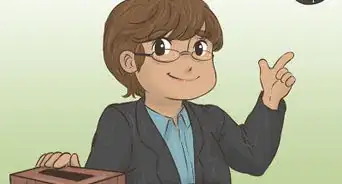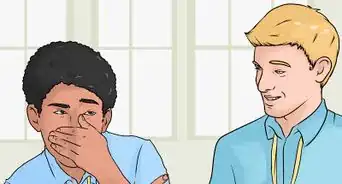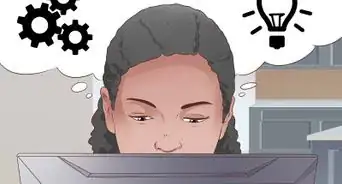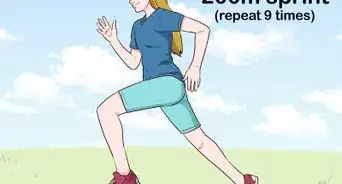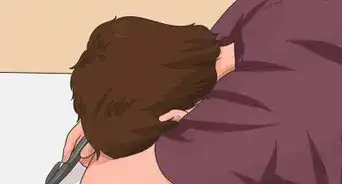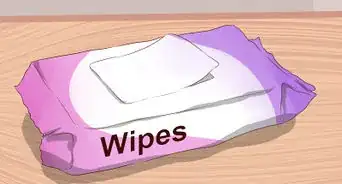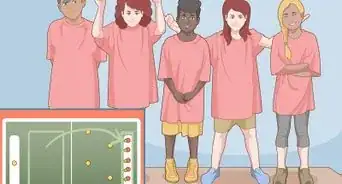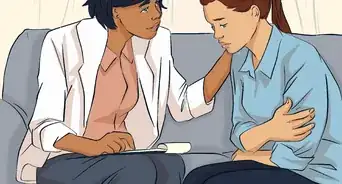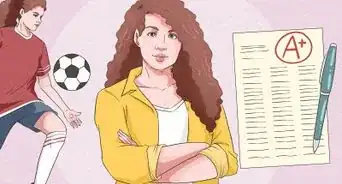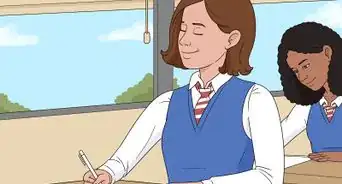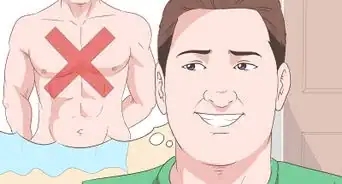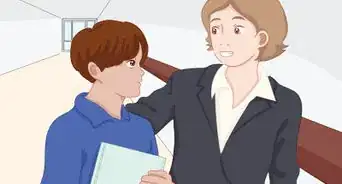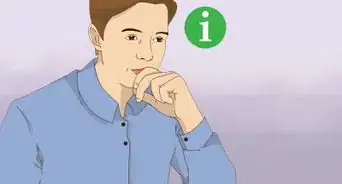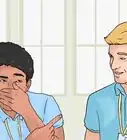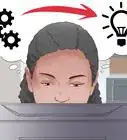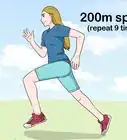wikiHow is a “wiki,” similar to Wikipedia, which means that many of our articles are co-written by multiple authors. To create this article, volunteer authors worked to edit and improve it over time.
There are 28 references cited in this article, which can be found at the bottom of the page.
This article has been viewed 5,910 times.
Learn more...
The years from kindergarten to grade levels 5 or 6 are the stepping stone to your future! Kids from ages 5-12 attend elementary school (called primary school in Ireland, the UK, Australia, Jamaica, and New Zealand and called junior school for grades 3-6 in Australia and the UK) around the world. Even though elementary/primary/junior/grade school sounds difficult to deal with, it is pretty easy compared to middle school and high school. If you are in elementary school, this article is for you.
Steps
Kindergarten/Year 1
Kindergarten (called Year 1 in the UK) [1] can be challenging for young kids! Since they have likely went to preschool or pre-kindergarten before, they have already practiced some of the concepts they'll need to learn in kindergarten. But being in a completely different school with more kids in one class is difficult. Kids in kindergarten are usually 4-6 years old.
-
1Review concepts your child has learned in preschool (nursery school in the UK), pre-kindergarten (called Reception in the UK), and/or transitional kindergarten. Most of a kid's early childhood education focuses on basic concepts like shapes, counting, learning sight words, and being curious about the world around them. Review some concepts during the summer and during the school year itself that your child has learned in earlier years.
- For math, you could review basic counting, like counting from 1 to 15 or 1 to 20. You could also use flashcards to review numbers and shapes. Write the name of the shape on one side and draw the shape itself on the other side. [2]
- For reading and writing, let your child practice writing short words and reciting the alphabet. You should also let them read easy picture books. Books by Dr. Seuss, the Elephant and Piggie series, the Pete the Cat series, and the Fly Guy series are suitable for kids aged 4-6 years old. [3]
- There aren't any guidelines for kindergarten science or history (since every district, state, prefecture, county, and country has different curriculum), but for science, allow your child to explore outside! Let them understand the weather (like sunny, snowy, windy, cloudy, rainy), see different bugs outside, and run around! This engages their curiosity. For history, you don't need to prepare anything for that, as each place's curriculum widely differs.
-
2Teach your child life skills for them to go to school. You'll need to teach your child how to be more independent. Instead of doing everything for your child, your child should be learning how to pack their bag for school, wake up on time (with or without an alarm clock), and change clothing fast enough in time for school.
- Teach your child on how to ask questions early on, since this will help them in the future (when things get more challenging). For example, if they have trouble doing a practice problem, they should ask the teacher on how to do it. If they need to use the bathroom, tell them to ask the teacher.
- You should also tell them to be wary of strangers. Tell them to not run towards a stranger or leave with a stranger unless you have told them they are safe/you know them.
- Tell them to wash their hands with soap and water every time they go to the bathroom. During times like the coronavirus pandemic, this is especially important. They should also wash their hands before they eat something, like a snack or lunch. Teach them how to use hand sanitizer- squeeze a little bit of sanitizer into their hands, and rub it around. Then, let it air dry.
Advertisement -
3Calm your child's fears of kindergarten. Some kids are optimistic about kindergarten, thinking that they are "big kids". Other kids might be nervous about new classmates, different teachers, and not knowing what happens at school. To combat this, read books about going to kindergarten. Multiple authors have written books about this to help kids understand what is going to happen at school.
- Read books like Wemberly Worried, If You Take a Mouse to School, Clifford Goes to Kindergarten, and Kindergarten, Here I Come! to get kids excited and confident about kindergarten.
- If your child has separation anxiety, check this article for more help on that.
-
4Take a tour of your child's primary school/elementary school. Kindergarten, or Year 1, is definitely a new experience for your child. Go to your child's school to locate which classroom they are in and where the bathrooms are. This will also relieve your child's anxiety about going to a larger school.
-
5Know what to pack inside of your child's backpack for the first day of kindergarten. Since there isn't that much homework to do in kindergarten, there aren't as many school supplies to pack. If your child's school gave out a school supply list, buy and help your child pack the needed folders, pencils, erasers, and school books. [4]
- Pencils (choose standard wood pencils for now as mechanical pencils' lead is likely to break if young children write too hard),
- Pencil grips (since small kids sometimes hold their pencil wrong, leading to hand injuries)
- Erasers (you can choose scented ones or puzzle erasers to make it more fun)
- Some extra colored pencils
- Some extra crayons
- A pair of safety scissors (designed to be safer for young students learning how to cut paper)
- A glue stick
- A pencil case to put the stationery in
- Plain white paper (for projects or drawing)
- Lined paper (get paper with wider lines, since kids often have large handwriting)
- Some folders for classwork and homework
- School books (depends on the school, so check your supply list to make sure!)
- A reusable water bottle to prevent your child from getting dehydrated
- Any medication your child may need, like an asthma inhaler, diabetes medication and pumps, ADHD medication, an EpiPen for allergic reactions, etc.
- A pack of small tissues (in case your child needs to wipe their hands, face, or nose)
- A small bottle of hand sanitizer (especially important during the coronavirus pandemic)
- A small toy to keep your child calm if they fidget a lot/have separation anxiety
Note: Some schools give out the school supplies and school books on the first day of school (like some private schools). If this is the case, just bring some extra pencils, erasers, a water bottle, and a lunch. They will be handed school supplies when they arrive at school, so packing extra is unnecessary.
First Grade/Year 2
First grade is basically a review of kindergarten, plus harder things added on to the basics learned in kindergarten (called Year 2 in the UK). It's not going to be too difficult for your child, as the concepts are the same, except that more information builds off of those concepts. Most kids in first grade or year 2 are aged 5-7.
-
1Review concepts your child has learned in kindergarten (called Year 1 in the UK). Kids in kindergarten or Year 1 learn counting from 1-20 or 1-30, recognize basic shapes (like circles, squares, triangles, and rectangles), and add 1-digit numbers (e.g., 3 + 5 = 8) in math. In reading, they usually read picture books.
- For math, you could review counting, like from 1-20 and 1-30. Review the basic shapes like circles, squares, triangles, and rectangles. You should also review basic 1-digit addition. Flashcards are the easiest way to review, although you could also play online games or stack objects for this purpose.
- For reading and writing, let your child practice writing short sentences (like "Mary ate a sandwich"). You should also let them read picture books or very short chapter books. Start teaching your child on how to recognize and spell their name correctly if they haven't yet. Shorter names (like Mia or Eddie) would be easier for your child to spell than longer names (like Samantha or Nathaniel). [5]
- There aren't any guidelines for first grade science, but for science, allow your child to explore outside! Let them understand the weather (like sunny, snowy, windy, cloudy, rainy), see different animals at the zoo, and run around! This engages their curiosity. For history, you don't need to prepare anything for that, as each place's curriculum widely differs.
-
2Review the things they are learning in first grade/year 2. Since your child is learning more information, it's important for them to practice what they have learned. Your child probably has assigned homework or worksheets, which can take from 5 minutes to 15 minutes of time to complete depending on the school's curriculum. Private schools usually teach harder curriculum and hand out more homework, so your child will need more time to complete it. Allow them to take time to do their homework. Only help them if they need help and don't just say the answer. This will not help your child learn why the answer is correct. Review the things they have learned on the weekends.
- For math, review things like 1-digit addition and 1-digit subtraction. You should also review on how to count money.
- For writing and spelling, review on writing short sentences and writing out words. You should also assist your child in writing a paragraph. Make sure each of their 4-6 sentences in the paragraph is grammatically correct. For grammar, review on capitalizing words and using nouns, verbs, adjectives and adverbs.
- Science curriculum differs, but teach them the different states of matter, the plant life cycle, and weather. These are commonly taught in first grade.
- History widely differs, but your child may learn about ancient civilization (e.g. Ancient Egypt, Mesopotamia, the Mayan civilization), your country's history, or world history.
-
3Teach your child life skills for them to go to school. You'll need to teach your child how to be more independent. Instead of doing everything for your child, your child should be learning how to pack their bag for school, wake up on time (with or without an alarm clock), and change clothing fast enough in time for school.
- Teach your child on how to ask questions early on, since this will help them in the future (when things get more challenging). For example, if they have trouble doing a practice problem, they should ask the teacher on how to do it. If they need to use the bathroom, tell them to ask the teacher.
- You should also tell them to be wary of strangers. Tell them to not run towards a stranger or leave with a stranger unless you have told them they are safe/you know them.
- Tell them to wash their hands with soap and water every time they go to the bathroom. During times like the coronavirus pandemic, this is especially important. They should also wash their hands before they eat something, like a snack or lunch. Teach them how to use hand sanitizer- squeeze a little bit of sanitizer into their hands, and rub it around. Then, let it air dry.
-
4Know what to pack inside of your child's backpack for the first day of first grade. Since there isn't that much homework to do in first grade, there aren't as many school supplies to pack. If your child's school gave out a school supply list, buy and help your child pack the needed folders, pencils, erasers, and school books. Basic things your child will need include:
- Pencils (choose standard wood pencils for now as mechanical pencils' lead is likely to break if young children write too hard)
- Pencil grips (since small kids sometimes hold their pencil wrong, leading to hand injuries)
- Erasers (you can choose scented ones or puzzle erasers to make it more fun)
- Some extra colored pencils
- Some extra crayons
- A pair of safety scissors (designed to be safer for young students learning how to cut paper)
- A glue stick
- A pencil case to put the stationery in
- Plain white paper (for projects or drawing)
- Lined paper (get paper with wider lines, since kids often have large handwriting)
- Some folders for classwork and homework
- School books (depends on the school, so check your supply list to make sure!)
- A reusable water bottle to prevent your child from getting dehydrated
- Any medication your child may need, like an asthma inhaler, diabetes medication and pumps, ADHD medication, an EpiPen for allergic reactions, etc.
- A pack of small tissues (in case your child needs to wipe their hands, face, or nose)
- A small bottle of hand sanitizer (especially important during the coronavirus pandemic)
- A small toy to keep your child calm if they fidget a lot/have separation anxiety
Note: Some schools give out the school supplies and school books on the first day of school (like some private schools). If this is the case, just bring some extra pencils, erasers, a water bottle, and a lunch. They will be handed school supplies when they arrive at school, so packing extra is unnecessary.
Second Grade/Year 3
Second grade (called Year 3 in the UK) is a time of new concepts. Many second graders/kids in Year 3 learn more arithmetic, like multiplication and division. They also learn more advanced addition and subtraction. They will add on to their grammar knowledge and spell out more words. Additionally, some schools teach cursive, which can help with a child's motor skills. Kids in second grade or Year 3 are usually 6-8 years old.
-
1Review concepts your child has learned in first grade (called Year 2 in the UK). Kids in first grade or Year 2 learn counting from 1-100, practice skip-counting (counting by 2s, 3s, 4s, etc.), and add and subtract in math. In reading, they usually read picture books or short chapter books. They also learn basic grammar rules, like capitalizing proper nouns, spelling words correctly, and using punctuation.
- For math, you could review counting, like from 1-100. You should also review basic 1-digit addition and 1-digit subtraction. Some schools teach harder curriculum (for all students or only gifted students), so review 2-digit addition and subtraction if the school has taught your child that. Flashcards are the easiest way to review, although you could also play online games like Prodigy or stack objects for this purpose.
- For reading and writing, let your child practice writing sentences (like "Mary went to the park"). Tell them to use proper grammar, like writing words correctly and correctly using adjectives and adverbs. You should also let them read short chapter books.
- There aren't any guidelines for second grade science or history (since every district, state, prefecture, county, and country has different curriculum), but for science, review the concepts of states of matter, weather, plants, sand animals. For history, you don't need to prepare anything for that, as each place's curriculum widely differs.
-
2Review the things they are learning in second grade/year 3. Since your child is learning more information, it's important for them to practice what they have learned. Your child probably has assigned homework or worksheets, which can take from 7 minutes to 20 minutes of time to complete depending on the school's curriculum. Private schools usually teach harder curriculum and hand out more homework, so your child will need more time to complete it. Allow them to take time to do their homework. Only help them if they need help and don't just say the answer. This will not help your child learn why the answer is correct. Review the things they have learned on the weekends. [6]
- For math, review things like 2-digit addition and subtraction, 1-digit multiplication and division, telling time, and rounding numbers. You should also review on how to count money and use units of length and weight in the metric and customary systems.
- For writing and spelling, review on writing short sentences and writing out words. For grammar, review on capitalizing words and using adjectives, adverbs, and prepositions. Practice reading and finding context clues to answer questions about a passage.
- Science curriculum differs, but teach them life cycles of animals and plants, the human body systems, different types of plants, and simple machines. These are commonly taught in second grade.
- History differs widely, but you may learn about ancient dynasties (like Ancient China, Ancient Rome, and Ancient Japan) or your country's history (like U.S. history and the Founding Fathers). In geography, your child may learn the different oceans and important cities in your country. [7]
- Your child may have computer science class as a mandatory class in elementary school. For example, the UK in 2014 mandated computer science classes in primary and secondary schools. [8] In this case, teach them how to type and use word processors in case they need to use these for a school project. They might learn typing at school, so you don't need to teach them all of the keys. You can also teach them basic programming using websites like Scratch and Tynker.
-
3Teach your child life skills for them to go to school. You'll need to teach your child how to be more independent. Instead of doing everything for your child, your child should be learning how to pack their bag for school and wake up on time (with or without an alarm clock). You should also teach them how to make their own bed. They should already know their basic hygiene practices- brushing their teeth, washing their face, changing clothes, and bathing.
- Teach your child on how to bathe/shower by themselves if they haven't yet. Some kids start very early (because the parent has taught early independence) at 4-5 years old, while others take a while to catch up, around the ages of 8-10 years old. 6-7 is a good time to start. [9] Tell your child to put soap on their body and wash all of the soap suds off. Washing hair can be tricky (as your child's hair type can require special maintenance), so it's ok to wait a few more years for them to do it by themselves.
- Teach your child on how to tell the teacher if something is wrong. Many children learn this skill at this age, and it is crucial for school. If your child doesn't feel well or is being bullied, they will need to tell the teacher.
- Teach your child on how to deal with bullying. Younger kids don't have the skills to bully others; they may just have tantrums, but no purposefully being rude to others. Starting from the ages of 7-8, kids may start to bully others for fun. The signs of your kid being bullied include suddenly losing school supplies, frequent injuries, and a reluctance to go to school. Tell your kid to always tell the teacher if someone is bullying them.
- You should also tell them to be wary of strangers. Tell them to not run towards a stranger or leave with a stranger unless you have told them they are safe/you know them. In addition to that, tell them not to accept candy or anything a stranger gives them unless you give them permission to.
- Teach your child to wash their hands with soap and water every time they go to the bathroom. During times like the coronavirus pandemic, this is especially important. Tell them to wash their hands before you eat something, like a snack or lunch. Use hand sanitizer- squeeze a little bit of sanitizer into their hands, and rub it around. Then, let it air dry.
-
4Know what to pack inside of your child's backpack for the first day of second grade. Since there isn't that much homework to do in second grade, there aren't as many school supplies to pack. If your child's school gave out a school supply list, buy and help your child pack the needed folders, pencils, erasers, and school books. Basic things your child will need include: [10]
- Pencils (choose standard wood pencils for now as mechanical pencils' lead is likely to break if young children write too hard)
- Pencil grips (since small kids sometimes hold their pencil wrong, leading to hand injuries)
- Erasers (you can choose scented ones or puzzle erasers to make it more fun)
- Some extra colored pencils
- Some extra crayons
- A pair of safety scissors (designed to be safer for young students learning how to cut paper)
- A glue stick
- A pencil case to put the stationery in
- Plain white paper (for projects or drawing)
- A few small notebooks (depends on how many subjects are taught)
- Some folders for classwork and homework
- School books (depends on the school, so check your supply list to make sure!)
- A reusable water bottle to prevent your child from getting dehydrated
- Any medication your child may need, like an asthma inhaler, diabetes medication and pumps, ADHD medication, an EpiPen for allergic reactions, etc.
- A pack of small tissues (in case your child needs to wipe their hands, face, or nose)
- A small bottle of hand sanitizer (especially important during the coronavirus pandemic)
- A small toy to keep your child calm if they fidget a lot/have separation anxiety
Note: Some schools give out the school supplies and school books on the first day of school (like some private schools). If this is the case, just bring some extra pencils, erasers, a water bottle, and a lunch. They will be handed school supplies when they arrive at school, so packing extra is unnecessary.
Third Grade/Year 4 (For Kids)
Third grade (called Year 4 in the UK) can be more challenging than previous grades. Kids are already learning how to deal with friendship problems, extracurriculars, and stress. Kids in this grade level also learn a lot of new concepts, including coordinate planes, measures of central tendency (mean/average, median, and mode), and probability. Kids in third grade or Year 4 are usually 7-9 years old.
-
1Review concepts you have learned in second grade (called Year 3 in the UK). Kids in second grade or Year 3 learn basic 1-digit multiplication and division, and add and subtract 2 or 3-digit numbers in math. In reading, they usually read short chapter books. They also learn more grammar, like pronouns, conjunctions, and interjections.
- For math, you could review 1-digit multiplication and division. You can also practice 2 and 3-digit addition and subtraction. Some schools teach harder curriculum (for all students or only gifted students), so review 2-digit multiplication and division if the school has taught you that. Flashcards are the easiest way to review, although you could also play online games like Prodigy or multiply using groups of objects for this purpose.
- For reading and writing, practice writing longer sentences (e.g., "Simon happily jogged to the park."). Use proper grammar, like correctly using prepositions and other parts of grammar in a sentence. Review on writing paragraphs if you need to. You should also read chapter books.
- The Magic Tree House series, the Roald Dahl collection of books, and the Geronimo Stilton series are good chapter book series to read. The Diary of a Wimpy Kid and Dog Man are good book series to read if you like comic books. The Who Was? series is great for learning about historical figures.
- There aren't any guidelines for second grade science or history, but for science, review life cycles of animals, parts of a plant, or human body systems (the excretory system, the digestive system, and the circulatory system are common systems taught). For history, you don't need to prepare anything for that, as each place's curriculum widely differs.
-
2Review the things you are learning in third grade/year 4. Since you are learning more information, it's important for you to practice what you have learned. You probably don't remember all of the things you've learned after a whole summer break (1-2 months of no learning/no school), so you need to review. You probably have assigned homework or worksheets, which can take from 15 minutes to 40 minutes of time to complete depending on the school's curriculum. Private schools usually teach harder curriculum and hand out more homework, so you will need more time to complete it. Take time to do your homework to prevent silly mistakes or sloppy handwriting.
- Review the things you have learned at school on the weekends.
- For math, review things like 3-digit addition and subtraction, 2-digit multiplication and division, measuring weight, measuring temperature, and measures of central tendency. You should also review on how to add and subtract fractions.
- For writing and spelling, focus on writing sentences (like "Bob went to the store instantly."). You should also review on writing multiple paragraphs for essays. For grammar, review on using pronouns, interjections, and conjunctions in a sentence.
- The Magic Tree House series, the Roald Dahl collection of books, and the Geronimo Stilton series are good chapter book series to read. The Diary of a Wimpy Kid and Dog Man are good book series to read if you like comic books. The Who Was? series is great for learning about historical figures. The book The One and Only Ivan is a heartwarming story that kids ages 7-9 can enjoy. [11]
- Science curriculum differs; review topics like classifying animals, physical and chemical changes, and the planets of the Solar System.
- History differs widely, but review things like Ancient Greece, the Vikings, Native Americans, or your country's history. [12]
- Your child may have computer science class as a mandatory class in elementary school. For example, the UK in 2014 mandated computer science classes in primary and secondary schools. [13] In this case, learn how to use word processors, spreadsheet programs, and presentation software if you haven't used these in a school project before. You can learn block coding using websites like Tynker and Scratch.
-
3Deal with puberty. Yes, puberty is completely normal at this age. Puberty seems to be getting earlier in the past decades. In the 1800s (the 19th century), people used to get a period at 17! [14] It sounds very late compared to the average of 11 or 12 nowadays. Some people are early bloomers and start at 8 years old, while others take more time to catch up, at the ages of 14-15. You may feel uncomfortable being the first one to start puberty, but you shouldn't worry about this. Your peers will catch up, and when puberty ends in adulthood, your bodies will all be fully developed.
- Deal with acne. Acne like pimples, blackheads, and whiteheads are embarrassing for some tweens. Wash your face twice a day (before and after school) and apply pimple cream on. Hydrocortisone cream, Salicylic acid or glycolic acid, benzoyl peroxide, or a sulfur-based cream are good creams to remove pimples.
- Cope with developing breasts as a kid or tween. If you have the signs of developing breasts, your chest may feel tender and hard.
- Deal with a period in elementary/primary school. Periods at the age of 8 are normal. But you may feel uncomfortable with your peers since most of them haven't started their periods left. You might feel left out or feel like you can't relate to them anymore, since they don't have to worry about tampons, pads, cramps, and leaks! They will get their periods in the following years, so you're not alone.
- Deal with erections. Males might worry about erections. They are very noticeable through your pants/trousers! Erections happen when your penis's tissue is engorged with blood. [15] This makes your penis hard, stiff, and uncomfortable. This can happen if you're thinking of romantic thoughts, but it can happen any time. Hide your erection by covering it with a bag, think of unromantic things, or pinch yourself to distract yourself using the pain.
-
4Use your life skills for school. You'll need to be more independent in the third grade/Year 4. You should know how to clean up your room, stay organized with assignments, and take care of your basic hygiene.
- Tell the teacher if something is wrong. Many children learn this skill at this age, and it is crucial for school. If you are being bullied (physically or emotionally) or if you feel sick, it is important to tell a teacher.
- Deal with peer pressure. Peer pressure is when people around you pressure you to do something. This can be helpful, like when parents pressure you to keep your grades above a C (70-79% in percent grades) or when friends pressure you to audition for the play that you were scared of auditioning for. But don't listen to bad peer pressure. Don't listen to anyone that tells you to do unethical or illegal things like bullying others, taking drugs, gambling, stealing something, vandalizing property, etc. You should tell a trusted adult about this immediately if they tell you to do illegal activities.
- You should be wary of strangers. Don't run towards a stranger or leave with a stranger unless your parents have told you they are safe/they know them. In addition to that, do not to accept candy or anything a stranger gives them unless your caretakers give you permission to. The things might be contaminated, so be careful.
- Learn how to say no. Saying no is difficult for some kids. Some are naturally brave, and some others have been taught from a young age to say no. But some kids might be shy, always put their own needs last, or are afraid of making the person angry if they say no to them. But it is important to do this- it sets healthy boundaries, and you are letting the person know that they can't boss you around all the time.
-
5Take care of your personal hygiene. You should brush your teeth twice a day (3 times if you have braces- after breakfast, after lunch, and after dinner), wash your face once per day, comb your hair before you head to school, and bathe or shower once every day (or every other day depending on how much you sweat and how much oil you produce).
- Showering usually takes faster than bathing, since filling up a tub full of water and washing the soap off of your body in a bathtub takes longer than rinsing yourself with water in a shower. So, you should consider showering more, especially if you have a tight schedule. Remember to wash your genitals with clean water.
- Learn how to wash your hair. As a kid, you probably didn't know how to wash your hair. Some kids start early in taking care of all their personal hygiene, at the ages of 5-7. Some kids become independent later, at ages 8-11. So it's normal that you don't know how to wash your hair yet. First, find out what your hair type is, since each hair type requires different care. Next, massage shampoo into your scalp and hair. Then, put conditioner on the ends of your hair. Lastly, carefully rinse all of the shampoo and conditioner out. You can then blow-dry it to achieve the hairstyle you want. You can leave it to air-dry, but your hair may be a bit messy afterwards.
- Brush your teeth after every meal you eat. If you have braces, check this article for information on how to take care of your braces at school.
- Wash your hands with soap and water every time you go to the bathroom. During times like the coronavirus pandemic, this is especially important. You should also wash your hands before you eat something, like a snack or lunch. Use hand sanitizer to freshen up if there isn't a sink nearby.
-
6Know what to pack inside of your backpack for the first day of third grade. Since homework is going to increase more in third grade, you'll have a few additional school supplies. Third grade is also a good time to buy a new backpack, since many kids are maturing, and don't want "silly" or "childish" cartoon characters on their backpacks anymore. If your school gave out a school supply list, tell your parents to buy your school supplies. Basic things you will need include: [16]
- Pencils (both wooden or mechanical pencils are fine)
- Pens (since some teachers tell students to correct their own homework starting from 3rd grade)
- Highlighters (useful for taking notes)
- Erasers (scented erasers, plain pink or white erasers, puzzle erasers, or electric erasers are commonly used)
- Some extra colored pencils
- Some extra crayons
- A pair of safety scissors
- A glue stick
- A ruler
- A pencil case to put the stationery in
- Plain white paper (for projects or drawing)
- A graph paper notebook or individual sheets of graph paper (for math when drawing on coordinate planes)
- A few notebooks (depends on how many subjects are taught)
- Some folders for classwork and homework
- School books (depends on the school, so check your supply list to make sure!)
- A backpack (a rolling backpack or a regular one can be fine)
- A reusable water bottle to prevent yourself from getting dehydrated
- Any medication you may need, like an asthma inhaler, diabetes medication and pumps, ADHD medication, an EpiPen for allergic reactions, etc.
- Period supplies (a few tampons, pads, extra underwear, wet wipes, period pain medication for cramps)
- A pack of small tissues (in case you need to wipe your hands, face, or nose)
- A small bottle of hand sanitizer (especially important during the coronavirus pandemic)
Note: Some schools give out the school supplies and school books on the first day of school (like some private schools). If this is the case, just bring some extra pencils, erasers, a water bottle, and a lunch. They will be handed school supplies when they arrive at school, so packing extra is unnecessary.
Fourth Grade/Year 5 (For Kids and Tweens)
Fourth grade (called Year 5 in the UK) is pretty similar to third grade, except that you add onto concepts you have already learned in the 3rd grade/Year 4. Many kids enter puberty in grade 4/Year 5, and friendships might shift due to conflict or differing interests. There will also be more responsibility in the fourth grade/Year 5. Kids in fourth grade or Year 5 are usually 8-10 years old.
-
1Review concepts you have learned in third grade (called Year 4 in the UK). Kids in third grade or Year 4 learn more advanced concepts. You'll need to review some of these concepts if you forgot how to do them during the summer.
- For math, you could review 2-digit multiplication and division. You can also practice 2 and 3-digit addition and subtraction. Some schools teach harder curriculum (for all students or only gifted students), so review 3-digit multiplication and division if the school has taught you that. You should also practice adding fractions and finding out the mean, median, and mode of a set of numbers. Doing problems on worksheets is the easiest way to review, although you could also play online games like Prodigy for this purpose.
- For reading and writing, practice writing sentences with proper grammar. Use proper grammar, like correctly using prepositions and other parts of grammar in a sentence. Review on writing paragraphs if you need to. You should also read chapter books.
- There aren't any guidelines for third grade science, but for science, review life cycles of animals, parts of a plant, or human body systems (the excretory system, the digestive system, and the circulatory system are common systems taught). For history, you don't need to prepare anything for that, as each place's curriculum widely differs.
-
2Review the things you are learning in fourth grade/year 5. Since you are learning more information, it's important for you to practice and study what you have learned. Teachers will expect you to become responsible for your homework and schedule, so don't think that they will remind you constantly of due dates and notes. You probably have assigned homework or worksheets, which can take from 35 minutes to 75 minutes (1 hour 15 minutes) of time to complete depending on the school's curriculum. Private schools usually teach harder curriculum and hand out more homework, so you will need more time to complete it. Take time to do your homework to prevent silly mistakes or sloppy handwriting. Review the things you have learned at school on the weekends.
- For math, review things like 2-digit multiplication and division, multiplying and dividing fractions, basic probability, graphing lines on coordinate planes, finding the slope of a line, finding the volume of rectangular prisms and cubes, finding the area of complex shapes, classifying angles by angle measure, etc. [17]
- For writing and spelling, review on writing essays. For grammar, practice using correct grammar and writing compound and complex sentences. You should also get used to writing sentences with direct and indirect objects and transitive and intransitive verbs.
- The Magic Tree House series, the Baby-sitters Club series, the Roald Dahl collection of books, and the Geronimo Stilton series are good chapter book series to read. The Harry Potter series and the Wings of Fire series are great for tweens who enjoy fantasy books. The Diary of a Wimpy Kid, books by Raina Telgemeier, and Dog Man are good book series to read if you like graphic novels. The Who Was? series is great for learning about historical figures. [18]
- Science curriculum differs, but review and practice topics like the human body, physical and chemical changes, atoms and molecules, animals, and other topics you have learned in 4th grade/Year 5.
- Starting from the 4th grade, you may have to do a science fair project. You will need to use the scientific method to answer a question. You'll need to write an essay explaining why you chose to do the project, what materials you need for the experiment, how to do the experiment, the results of the experiment, and what you have learned from it.
- History differs widely, but review things like the American Revolution, the Founding Fathers of the U.S., medieval England, Elizabethan England, and other topics you have learned about. [19]
- You may have computer science class as a mandatory class or a club in 4th grade/Year 5. For example, the UK in 2014 mandated computer science classes in primary and secondary schools. [20] In this case, learn block coding using websites like Tynker and Scratch. Some schools start teaching text coding using Python or JavaScript, so learn the basics of these coding languages beforehand.
-
3Deal with puberty. Yes, puberty is completely normal at this age. Puberty seems to be getting earlier in the past decades. In the 1800s (the 19th century), people used to get a period at 17! [21] It sounds very late compared to the average of 11 or 12 nowadays. Some people are early bloomers and start at 8 years old, while others take more time to catch up, at the ages of 14-15. You may feel uncomfortable being the first one to start puberty, but you shouldn't worry about this. Your peers will catch up, and when puberty ends in adulthood, your bodies will all be fully developed.
- Deal with acne. Acne like pimples, blackheads, and whiteheads are embarrassing for some tweens. Wash your face twice a day (before and after school) and apply pimple cream on. Hydrocortisone cream, Salicylic acid or glycolic acid, benzoyl peroxide, or a sulfur-based cream are good creams to remove pimples.
- Cope with developing breasts as a kid or tween. If you have the signs of developing breasts, your chest may feel tender and hard.
- Deal with a period in elementary/primary school. Periods at the ages of 9-10 are normal. But you may feel uncomfortable with your peers since most of them haven't started their periods left. You might feel left out or feel like you can't relate to them anymore, since they don't have to worry about tampons, pads, cramps, and leaks! They will get their periods in the following years, so you're not alone.
- Deal with erections. Males might worry about erections. They are very noticeable through your pants/trousers! Erections happen when your penis's tissue is engorged with blood. [22] This makes your penis hard, stiff, and uncomfortable. This can happen if you're thinking of romantic thoughts, but it can happen any time. Hide your erection by covering it with a bag, think of unromantic things, or pinch yourself to distract yourself using the pain.
-
4Use your life skills for school. You'll need to be more independent in the fourth grade/Year 5. You should know how to clean up your room, stay organized with assignments, and take care of your basic hygiene.
- Deal with bullying. Bullies might physically hurt you (kicking, shoving, pushing, or slamming you) or emotionally hurt you (making fun of you, calling you mean nicknames, saying untrue things about you/gossiping). Being bullied is scary, so you'll need to report the person bullying you to a teacher.
- Deal with peer pressure. Peer pressure is when people around you pressure you to do something. This can be helpful, like when parents pressure you to keep your grades above a C (70-79% in percent grades) or when friends pressure you to audition for the play that you were scared of auditioning for. But don't listen to bad peer pressure. Don't listen to anyone that tells you to do unethical or illegal things like bullying others, taking drugs, gambling, stealing something, vandalizing property, etc. You should tell a trusted adult about this immediately if they tell you to do illegal activities.
- Learn how to say no. Saying no is difficult for some kids. Some are naturally brave, and some others have been taught from a young age to say no. But some kids might be shy, always put their own needs last, or are afraid of making the person angry if they say no to them. But it is important to do this- it sets healthy boundaries, and you are letting the person know that they can't boss you around all the time.
-
5Take care of your personal hygiene. You should brush your teeth twice a day (3 times if you have braces), wash your face once per day, comb your hair before you head to school, and bathe or shower once every day (or every other day depending on how much you sweat).
- Shave your hair. During puberty, hair will grow on your armpits, chest if you're a male, your private parts, face, and sometimes your back. Learn how to shave your armpit hair, pubic hair, and leg hair if you have hair in these areas.
- Showering usually takes faster than bathing, since filling up a tub full of water and washing the soap off of your body in a bathtub takes longer than rinsing yourself with water in a shower. So, you should consider showering more, especially if you have a tight schedule. If you're in puberty, wash every day instead of every other day if you didn't yet, since your body will produce more oil because of the hormones. Remember to wash your genitals with clean water.
- Learn how to wash your hair. As a kid, you probably didn't know how to wash your hair. Some kids start early in taking care of all their personal hygiene, at the ages of 5-7. Some kids become independent later, at ages 8-11. So it's normal that you don't know how to wash your hair yet. First, find out what your hair type is, since each hair type requires different care. Next, massage shampoo into your scalp and hair. Then, put conditioner on the ends of your hair. Lastly, carefully rinse all of the shampoo and conditioner out. You can then blow-dry it to achieve the hairstyle you want. You can leave it to air-dry, but your hair may be a bit messy afterwards.
- Brush your teeth after every meal you eat. If you have braces, check this article for information on how to take care of your braces at school.
- Wash your hands with soap and water every time you go to the bathroom. During times like the coronavirus pandemic, this is especially important. You should also wash your hands before you eat something, like a snack or lunch. Use hand sanitizer to freshen up if there isn't a sink nearby.
-
6Know what to pack inside of your backpack for the first day of fourth grade. Since homework is going to increase more in fourth grade, you'll have more school supplies. Fourth grade is also a good time to buy a new backpack, since many kids are maturing, and don't want "silly" or "childish" cartoon characters on their backpacks anymore. You might also need a computer, which your school will likely supply for you if you don't have a home computer at home. Usually schools only allow school computers to be used in class, so even if you don't have a home computer, you can receive one from the school. If your school gave out a school supply list, tell your parents to buy your school supplies. Basic things you will need include: [23]
- Pencils (both wooden or mechanical pencils are fine)
- Pens (since some teachers tell students to correct their own homework starting from 3rd grade)
- Highlighters (useful for taking notes)
- Erasers (scented erasers, plain pink or white erasers, puzzle erasers, or electric erasers are commonly used)
- Some extra colored pencils
- Some extra crayons
- A pair of scissors
- A glue stick
- A ruler
- A pencil case to put the stationery in
- Plain white paper (for projects or drawing)
- A graph paper notebook or individual sheets of graph paper (for math when drawing on coordinate planes)
- A few notebooks (depends on how many subjects are taught)
- Some folders for classwork and homework
- School books (depends on the school, so check your supply list to make sure!)
- A binder (to put papers into)
- A backpack (a rolling backpack or a regular one can be fine)
- Headphones or earbuds (for computer usage)
- A reusable water bottle to prevent yourself from getting dehydrated
- Any medication you may need, like an asthma inhaler, diabetes medication and pumps, ADHD medication, an EpiPen for allergic reactions, etc.
- Period supplies (a few tampons, pads, extra underwear, wet wipes, period pain medication for cramps)
- A pack of small tissues (in case you need to wipe your hands, face, or nose)
- A small bottle of hand sanitizer (especially important during the coronavirus pandemic)
Note: Some schools give out the school supplies and school books on the first day of school (like some private schools). If this is the case, just bring some extra pencils, erasers, a water bottle, and a lunch. They will be handed school supplies when they arrive at school, so packing extra is unnecessary.
Fifth Grade/Year 6 (For Tweens)
Fifth grade (called Year 6 in the UK) prepares you for middle school/secondary school. In many North American schools, fifth grade is the last year of elementary school. Other schools may have sixth grade as part of elementary school. In the UK, Year 6 is also the last year of primary school. Years 7 and beyond is middle school, or secondary school. [24]
-
1Review concepts you have learned in fourth grade (called Year 5 in the UK). Kids in fourth grade or Year 5 learn more new concepts. It can be challenging to remember all of them. You'll need to review some of these concepts if you forgot how to do them during the summer.
- For math, you could review multiplying and dividing fractions, finding the slope of a line, calculating volumes of rectangular prisms, and classify angles. Doing problems on worksheets is the easiest way to review, although you could also play online games like Prodigy for this purpose.
- For reading and writing, review on writing paragraphs if you need to. You can practice writing different types of essays, like argumentative essays and descriptive essays. You should also read books and news online.
- There aren't any guidelines for fourth grade science, but for science, review body systems of animals, human body systems, atoms and molecules, and other things you may have learned in 4th grade/Year 5. For history, you don't need to prepare anything for that, as each place's curriculum widely differs.
-
2Review the things you are learning in fifth grade/year 6. Since you are learning more information, it's important for you to practice and study what you have learned. Teachers will expect you to become responsible for your homework and schedule, so don't think that they will remind you constantly of due dates and notes. You probably have assigned homework or worksheets, which can take from 45 minutes to 95 minutes (1 hour 35 minutes) of time to complete depending on the school's curriculum. Private schools usually teach harder curriculum and hand out more homework, so you will need more time to complete it. Take time to do your homework to prevent silly mistakes or sloppy handwriting. Review the things you have learned at school on the weekends.
- For math, review things like multiplying and dividing fractions, graphing lines on coordinate planes, finding the slope of a line, finding the volume of triangular prisms and cylinders, finding the area and circumference of a circle, solving exponents with no variables, drawing different graphs (bar graphs, pie charts, histograms, writing scientific notation, line graphs), etc. [25]
- For writing and spelling, review on writing essays. For grammar, practice using correct grammar and writing a mixture of compound, complex, and simple sentences in your writing. Use coordinating (FANBOYS) and subordinating conjunctions in your writing. You should also get used to writing sentences with direct and indirect objects and transitive and intransitive verbs.
- Your school may tell you to read books like Gulliver's Travels, The Secret Garden, Johnny Tremain, and A Midsummer Night's Dream as classical books to read. Your school might assign you other books like Wonder, Bridge to Terabithia, The Phantom Tollbooth, Esperanza Rising, and Hatchet. [26] Make sure to read online summaries to summarize the book and to take clear notes on the characters, plot, and themes of the novel.
- Science curriculum differs, but review and practice topics like atoms and molecules, classification of animals, elements in the periodic table, chemical equations, and other things you have learned in grade 5/Year 6. The science curriculum may also include a talk on puberty and your changing body, so be prepared for sensitive discussions on this.
- Starting from the 4th grade, you may have to do a science fair project. You will need to use the scientific method to answer a question. You'll need to write an essay explaining why you chose to do the project, what materials you need for the experiment, how to do the experiment, the results of the experiment, and what you have learned from it.
- History differs widely, but review things like the 15th century explorers, sea trade, Native Americans, the Renaissance, and other topics you have learned about. [27]
- You may have computer science class as a mandatory class or a club in 5th grade/Year 6. For example, the UK in 2014 mandated computer science classes in primary and secondary schools. [28] In this case, learn block coding using websites like Tynker and Scratch. Many schools start teaching text coding using Python or JavaScript in this grade level, so learn the basics of these beforehand. Learn the syntax, the data types, how to write if statements, how to concatenate strings, and other basics of the programming language. You can also learn Python Turtle, which is a Python library that you can import to draw shapes and other drawings.
-
3Deal with puberty. Yes, puberty is completely normal at this age. Puberty seems to be getting earlier in the past decades. In the 1800s (the 19th century), people used to get a period at 17! [29] It sounds very late compared to the average of 11 or 12 nowadays. Some people are early bloomers and start at 8 years old, while others take more time to catch up, at the ages of 14-15. You may feel uncomfortable being the first one to start puberty, but you shouldn't worry about this. Your peers will catch up, and when puberty ends in adulthood, your bodies will all be fully developed.
- Deal with acne. Acne like pimples, blackheads, and whiteheads are embarrassing for some tweens. Wash your face twice a day (before and after school) and apply pimple cream on. Hydrocortisone cream, Salicylic acid or glycolic acid, benzoyl peroxide, or a sulfur-based cream are good creams to remove pimples.
- Cope with developing breasts as a kid or tween. If you have the signs of developing breasts, your chest may feel tender and hard.
- Deal with a period in elementary/primary school. Periods at the ages of 10-11 are normal. But you may feel uncomfortable with your peers since many of them haven't started their periods yet. You might feel left out or feel like you can't relate to them in dealing with menstruation issues, since they don't have to worry about tampons, pads, cramps, and leaks! They will get their periods in the following years, so you're not alone.
- Deal with erections. Males might worry about erections. They are very noticeable through your pants/trousers! Erections happen when your penis's tissue is engorged with blood. [30] This makes your penis hard, stiff, and uncomfortable. This can happen if you're thinking of romantic thoughts, but it can happen any time. Hide your erection by covering it with a bag, think of unromantic things, or pinch yourself to distract yourself using the pain.
-
4Use your life skills for school. You'll need to be more independent in the fifth grade/Year 6. Since you are one of the older kids in your elementary/primary school, you will need to be a role model for the other younger children. You should know how to clean up your room, stay organized with assignments, take responsibility for your own actions, and take care of your basic hygiene.
- Deal with bullying. Bullies might physically hurt you (kicking, shoving, pushing, or slamming you) or emotionally hurt you (making fun of you, calling you mean nicknames, saying untrue things about you/gossiping). Being bullied is scary and never fun, so you'll need to report the person bullying you to a teacher.
- Deal with peer pressure. Peer pressure is when people around you pressure you to do something. This can be helpful, like when parents pressure you to keep your grades above a C (70-79% in percent grades) or when friends pressure you to audition for the play that you were scared of auditioning for. But don't listen to bad peer pressure. Don't listen to anyone that tells you to do unethical or illegal things like bullying others, taking drugs, gambling, stealing something, vandalizing property, etc. You should tell a trusted adult about this immediately if they tell you to do illegal activities.
- Learn how to say no. Saying no is difficult for some kids. Some are naturally brave, and some others have been taught from a young age to say no. But some kids might be shy, always put their own needs last, or are afraid of making the person angry if they say no to them. But it is important to do this- it sets healthy boundaries, and you are letting the person know that they can't boss you around all the time. You aren't their servant, and you don't have the time or energy to help them all the time.
-
5Take care of your personal hygiene. You should brush your teeth twice a day (3 times if you have braces), wash your face once per day, comb your hair before you head to school, and bathe or shower once every day (or every other day depending on how much you sweat).
- Shave your hair. During puberty, hair will grow on your armpits, chest if you're a male, your private parts, face, and sometimes your back. Learn how to shave your armpit hair, pubic hair, and leg hair if you have hair in these areas.
- Showering usually takes faster than bathing, since filling up a tub full of water and washing the soap off of your body in a bathtub takes longer than rinsing yourself with water in a shower. So, you should consider showering more, especially if you have a tight schedule. If you're in puberty, wash every day instead of every other day if you didn't yet, since your body will produce more oil because of the hormones.
- Learn how to wash your hair. As a kid, you probably didn't know how to wash your hair. Some kids start early in taking care of all their personal hygiene, at the ages of 5-7. Some kids become independent later, at ages 8-11. So it's normal that you don't know how to wash your hair yet. Find out what your hair type is, since each hair type requires different care.
- Brush your teeth after every meal you eat. If you have braces, check this article for information on how to take care of your braces at school.
- Wash your hands with soap and water every time you go to the bathroom. During times like the coronavirus pandemic, this is especially important. You should also wash your hands before you eat something, like a snack or lunch. Use hand sanitizer to freshen up if there isn't a sink nearby.
-
6Know what to pack inside of your backpack for the first day of fifth grade/Year 6. Since homework is going to increase more in fifth grade, you'll have more school supplies. If your school gave out a school supply list, tell your parents to buy your school supplies. You might also need a computer, which your school will likely supply for you if you don't have a home computer at home. Usually schools only allow school computers to be used in class, so even if you don't have a home computer, you can receive one from the school. Basic things you will need include: [31]
- Pencils (both wooden or mechanical pencils are fine)
- Pens
- Highlighters (useful for taking notes)
- Erasers (scented erasers, plain pink or white erasers, puzzle erasers, or electric erasers are commonly used)
- Some extra colored pencils
- Some extra crayons
- A pair of scissors
- A glue stick
- A ruler
- A protractor (to measure angles with)
- A pencil case to put the stationery in
- Plain white paper (for projects or drawing)
- A graph paper notebook or individual sheets of graph paper (for math when drawing on coordinate planes)
- A few notebooks (depends on how many subjects are taught)
- A planner (to keep track of assignments, tests, and due dates)
- Some folders for classwork and homework
- School books (depends on the school, so check your supply list to make sure!)
- A binder (to put papers into)
- A backpack (a rolling backpack or a regular one can be fine)
- Headphones or earbuds (for computer usage)
- A reusable water bottle to prevent yourself from getting dehydrated
- Any medication you may need, like an asthma inhaler, diabetes medication and pumps, ADHD medication, an EpiPen for allergic reactions, etc.
- Period supplies (a few tampons, pads, extra underwear, wet wipes, period pain medication for cramps)
- A pack of small tissues (in case you need to wipe your hands, face, or nose)
- A small bottle of hand sanitizer (especially important during the coronavirus pandemic)
Note: Some schools give out the school supplies and school books on the first day of school (like some private schools). If this is the case, just bring some extra pencils, erasers, a water bottle, and a lunch. They will be handed school supplies when they arrive at school, so packing extra is unnecessary.
-
7Deal with fifth grade graduation. For some schools, fifth grade is the last year of elementary school! In the UK, Year 6 is the final year of primary school also. This means a lot to tweens that have reached an important school-related milestone. You might feel excited that you've grown up a lot and learned a lot during school, or you may feel sad that you're leaving your friends and teachers.
- Some schools let their students wear a pretend hat and gown, like high school or college graduation. Wear this to the graduation ceremony. You should also wash yourself with nice-smelling soap the day before. You can also try out a cool hairstyle if you want.
- It's ok to cry before or after the ceremony. After all, your best friends might be going to different schools than you, and the teachers that have known you for so long won't be with you anymore. Cry it all out, and hug your friends if they can't contact you and are going to different schools.
- Sign your classmates' yearbooks. Sign all of your classmates' yearbooks, even the ones you're not familiar with or are mean. See this article for more information on graduating fifth grade.
- Be proud of yourself that you've made it this far! You've probably done your best in school, learned from your 5-year experience, and made a lot of good friends! Even if there were bullies at your school, be proud of yourself that you knew how to deal with them. Your caretakers and relatives are probably going to be very happy about your elementary/primary school graduation.
Things You'll Need
- Pencils (both wooden or mechanical pencils are fine)
- Pens (since some teachers tell students to correct their own homework starting from 3rd grade)
- Highlighters (useful for taking notes)
- Erasers (scented erasers, plain pink or white erasers, puzzle erasers, or electric erasers are commonly used)
- Some extra colored pencils
- Some extra crayons
- A pair of scissors
- A glue stick
- A ruler
- A protractor (to measure angles with)
- A pencil case to put the stationery in
- Plain white paper (for projects or drawing)
- A few notebooks (depends on how many subjects are taught)
- A planner (to keep track of assignments, tests, and due dates)
- Some folders for classwork and homework
- School books (depends on the school, so check your supply list to make sure!)
- A binder (to put papers into)
- A backpack (a rolling backpack or a regular one can be fine)
- Headphones or earbuds (for computer usage)
- A reusable water bottle to prevent yourself from getting dehydrated
- Any medication you may need, like an asthma inhaler, diabetes medication and pumps, ADHD medication, an EpiPen for allergic reactions, etc.
- Period supplies (a few tampons, pads, extra underwear, wet wipes, period pain medication for cramps)
- A pack of small tissues (in case you needs to wipe their hands, face, or nose)
- A small bottle of hand sanitizer (especially important during the coronavirus pandemic)
References
- ↑ https://www.merriam-webster.com/dictionary/reception%20class
- ↑ https://www.parents.com/kids/education/elementary-school/your-kid-will-learn-in-kindergarten/
- ↑ https://www.scholastic.com/teachers/teaching-tools/book-lists/16-best-books-to-get-kindergartners-reading.html
- ↑ https://www.staples.com/deals/Shop-Grades-K-2/BI1378355
- ↑ https://www.thoughtco.com/typical-course-of-study-kindergarten-1828414
- ↑ https://www.thoughtco.com/typical-course-of-study-kindergarten-1828414
- ↑ https://www.verywellfamily.com/what-do-kids-learn-in-2nd-grade-620991
- ↑ https://www.gov.uk/government/publications/d5-london-summit-themes/d5-london-teaching-children-to-code
- ↑ https://www.babycenter.com/child/development/when-will-my-child-be-ready-to-shower-instead-of-bathe_70665#:~:text=Around%20age%206,%20your%20child,he%20is%20in%20the%20shower.
- ↑ https://www.teacherlists.com/2nd-grade-school-supply-list
- ↑ https://www.commonsensemedia.org/lists/best-books-for-third-graders
- ↑ https://www.thoughtco.com/typical-course-of-study-kindergarten-1828414
- ↑ https://www.gov.uk/government/publications/d5-london-summit-themes/d5-london-teaching-children-to-code
- ↑ https://www.psychologytoday.com/us/articles/201908/why-more-kids-are-starting-puberty-earlier-ever
- ↑ https://kidshealth.org/en/teens/normal-erections.html
- ↑ https://www.teacherlists.com/3rd-grade-school-supply-list
- ↑ https://www.verywellfamily.com/what-do-kids-learn-in-4th-grade-620992
- ↑ https://shop.scholastic.com/parent-ecommerce/grades/4th-grade.html
- ↑ https://www.thoughtco.com/typical-course-of-study-kindergarten-1828414
- ↑ https://www.gov.uk/government/publications/d5-london-summit-themes/d5-london-teaching-children-to-code
- ↑ https://www.psychologytoday.com/us/articles/201908/why-more-kids-are-starting-puberty-earlier-ever
- ↑ https://kidshealth.org/en/teens/normal-erections.html
- ↑ https://www.teacherlists.com/3rd-grade-school-supply-list
- ↑ https://www.goodschoolsguide.co.uk/choosing-a-school/state-schools/secondary-school-admissions
- ↑ https://www.verywellfamily.com/what-do-kids-learn-in-5th-grade-620993
- ↑ https://www.weareteachers.com/5th-grade-books/
- ↑ https://www.thoughtco.com/typical-course-of-study-kindergarten-1828414
- ↑ https://www.gov.uk/government/publications/d5-london-summit-themes/d5-london-teaching-children-to-code
- ↑ https://www.psychologytoday.com/us/articles/201908/why-more-kids-are-starting-puberty-earlier-ever
- ↑ https://kidshealth.org/en/teens/normal-erections.html
- ↑ https://www.teacherlists.com/3rd-grade-school-supply-list
- ↑ https://www.collinsdictionary.com/us/dictionary/english/eleven-plus#:~:text=eleven%2Dplus%20in%20British%20English,a%20child%20will%20be%20given
- ↑ https://www.explorelearning.co.uk/11-plus-exams/what-is-the-11-plus/
- ↑ https://easya.io/blog/grammar-schools-11-plus-commonly-asked-questions
- ↑ https://www.scholastic.com/teachers/teaching-tools/book-lists/26-books-to-get-fifth-graders-reading.html
- ↑ https://www.liveabout.com/how-often-should-i-shampoo-black-hair-400058
- ↑ https://www.hair.com/how-to-wash-thick-hair.html#:~:text=But%20if%20you%20love%20to,build%20up%20its%20natural%20oils.%22
- ↑ https://www.healthline.com/health/how-often-to-wash-curly-hair#the-short-answer
- ↑ https://www.webmd.com/beauty/features/how-often-wash-hair
- ↑ https://www.healthline.com/health/how-to-clean-your-vagina#how-to-wash
- ↑ https://www.healthline.com/health/how-to-get-rid-of-smegma#in-males
